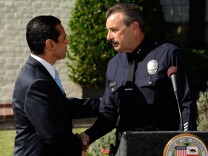
-
Listen Listen

Frank Stoltze
What I cover
I cover how well democracy is working, how various social and political movements seek to improve the lives of Angelenos and how national conversations are affecting local decision making.
My background
I arrived in L.A. in 1991, the year four LAPD officers beat Rodney King and a year before the riots/rebellion. I’ve covered everything from fires and floods to police corruption and political scandal. My work has been recognized by the Society of Professional Journalists, the L.A. Press Club and the Associated Press.
My goals
I seek to listen to a wide variety of community voices as I hold powerful people accountable and to reveal how seemingly small policy changes have large-scale ripple effects on the people of L.A.
Best way to reach me
I would love to hear your feedback, questions and ideas. You can reach me by email at fstoltze@laist.com, or if you have a tip you’d like to share more privately, you can reach me on Signal. My username is @frankstoltze.
Stories by Frank Stoltze
-
One year after its creation, a big question remains: Can the panel effectively influence Sheriff's Department policy if it has no real authority over the sheriff?
-
A video posted to Facebook shows a Los Angeles police officer pulling a young woman off the subway. She can be heard complaining that she was removed for having her feet on the seat.
-
First Assistant Chief Michel Moore and Assistant Chiefs Beatrice Girmala and Jorge Villegas would all be contenders if they choose to seek the top job.
-
Robert Riskin's 61-year-old mother was missing. He and a friend put on wetsuits and waded chest deep through mud searching for her, calling out her name in the dark.
-
One couple in Montecito's mandatory evacuation zone ended up staying at a friend's guesthouse in the voluntary evacuation zone. It seemed like a good idea at the time.
-
It was an overflow crowd at the Pasadena City Council meeting Monday night, as nearly 200 people came out to protect the police beating of a young African-American man.
-
A group of activists in Pasadena say oversight is needed after police officers broke the leg of a young black man as they struggled with him during a traffic stop in November.
-
Nicola Hanna wouldn't say whether he'll prosecute marijuana distributors after Obama-era restrictions on enforcing federal pot laws were lifted.
-
While noting "a new day in law enforcement," the department says it's not planning to deploy additional officers to enforce new cannabis rules.
-
California has the most restrictive police records laws in the nation — and it's because of something called the "Pitchess process."
-
It’s been nearly 30 years since a grand jury was convened to look at a potential problem with L.A.'s criminal justice system. Prominent attorney Charles Linder says it's time for another.
-
Governor Brown is expected to ask for millions of dollars to improve emergency alert systems throughout the state, which are mostly controlled by local authorities.












